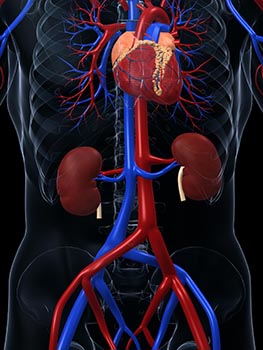A higher urinary albumin-to-creatinine ratio is associated with greater risk of incident but not recurrent coronary heart disease in blacks compared with whites in a new study by University of Alabama at Birmingham (UAB) researchers and colleagues published in the Aug. 21, 2013, issue of the Journal of the American Medical Association (JAMA).
 “Increased urinary albumin excretion is an important marker of kidney injury and a strong risk factor for cardiovascular disease,” says Orlando M. Gutierrez, M.D., assistant professor of medicine in the UAB Division of Nephrology and lead researcher for the study. “Black individuals have higher levels of urinary albumin excretion than white individuals, which may contribute to racial disparities in cardiovascular outcomes.”
“Increased urinary albumin excretion is an important marker of kidney injury and a strong risk factor for cardiovascular disease,” says Orlando M. Gutierrez, M.D., assistant professor of medicine in the UAB Division of Nephrology and lead researcher for the study. “Black individuals have higher levels of urinary albumin excretion than white individuals, which may contribute to racial disparities in cardiovascular outcomes.”
Previous research indicated that the association of urinary albumin-to-creatinine ratio (ACR) with incident stroke differed by race; higher urinary ACR was independently associated with a greater risk of incident stroke in blacks but not in whites. Whether similar associations extend to coronary heart disease (CHD) is unclear.
Gutierrez and colleagues conducted the study to determine if the association of urinary albumin excretion with CHD differs by race. The study included black and white U.S. adults, ages 45 and older, who were enrolled in the Reasons for Geographic and Racial Differences in Stroke (REGARDS) study between 2003-07 with follow-up through December 2009. The researchers examined race-stratified associations of urinary ACR in two groups — incident CHD among 23,273 participants free of CHD at baseline and first recurrent CHD event among 4,934 participants with CHD at baseline.
A total 616 incident CHD events (259 among black participants and 357 among white participants) were observed in an average follow-up of 4.5 years. Of these, 421 were nonfatal heart attacks and 195 were CHD-related deaths. Analysis indicated that age- and sex-adjusted incidence rates increased in the higher categories of urinary ACR in both black and white participants. The adjusted incidence rates in the two highest categories of ACR were approximately 1.5-fold greater in black participants when compared with white participants.
“In models adjusted for traditional cardiovascular risk factors and medications, higher baseline urinary ACR was associated with greater risk of incident CHD among black participants,” Gutierrez says. “Among those with CHD at baseline, fully adjusted associations of baseline urinary ACR with first recurrent CHD event were similar between black and white participants.”
“These findings confirm the results of prior studies showing that urinary ACR is an important biomarker for CHD risk in the general population, even among individuals with ACR values that are less than the current threshold for defining microalbuminuria. Additionally, to our knowledge, this is the first study to demonstrate that the higher risk of incident CHD associated with excess ACR differs by race.”
Gutierrez and his colleagues say future studies should examine whether the addition of ACR can improve the diagnosis and management of CHD in black individuals.